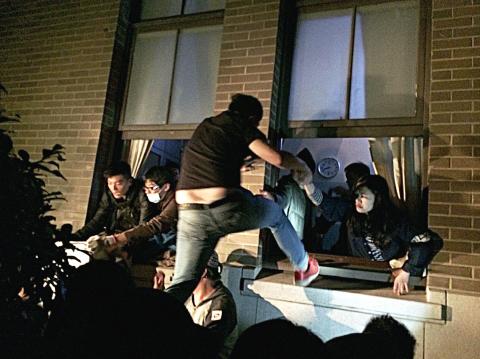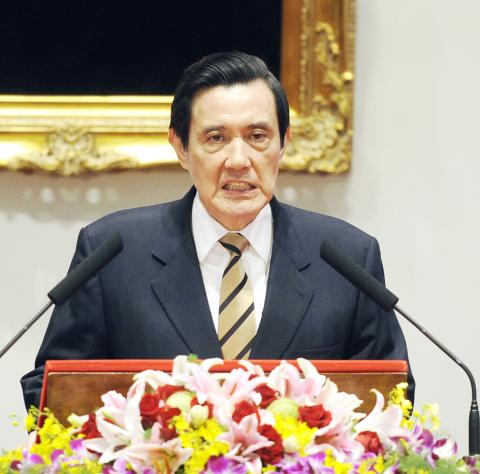Mounting frustration over what they see as the government’s lack of sincerity in addressing protesters’ demands over the cross-strait services trade pact led students to force their way through security barricades and razor wire into the Executive Yuan complex in Taipei last night to stage a sit-in.
At about 7:30pm, hundreds of students vaulted the barriers at the three main entrances of the Executive Yuan compound, clashing with police carrying shields and truncheons. As more students poured in, the police were outnumbered and in just half an hour, the complex was almost entirely occupied.
About one hour later, the students made it to the second floor of the Executive Yuan’s main building and, using a ladder, burst into Premier Jiang Yi-huah’s (江宜樺) office.

Photo: CNA
Several police officers and students were hurt in the ensuing melee as more police were deployed to contain the situation and ambulances called in to tend to the injured, which included some protesters who fainted and others injured by broken glass.
Meanwhile, more protesters gathered outside the building, shouting slogans such as: “Rejecting the cross-strait service trade agreement, defending democracy.”
They said they decided to occupy the Executive Yuan because President Ma Ying-jeou (馬英九) had apparently failed to understand the concerns they have repeatedly expressed over the past days.

Photo: George Tsorng, Taipei Times
At a press conference yesterday morning, Ma showed that he was completely ignoring the public’s voices, the activists said.
“We are here to tell Ma that he should listen to the public’s angry shouts and listen to their voices,” the students said, adding: “We will demonstrate citizens’ strength again and again.”
“Tonight we are in the Executive Yuan. Tomorrow we will go to other government agencies to voice our concerns,” they shouted.
Taiwanese should not be afraid of the government, the government should be afraid of them, the protesters added.
Protest leader Chen Wei-ting (陳為廷), a National Tsing Hua University student, said last night that the move to break into the Executive Yuan was not initiated by members of the Black Island Nation Youth Front — the group behind the Legislative Yuan occupation.
However, he said he fully respected civic groups’ decision to occupy the Executive Yuan compound, while fellow protest leader Lin Fei-fan (林飛帆), a National Taiwan University student and another key figure in the legislative occupation, stressed the principles of peace and non-violence.
At 11pm, Premier Jiang Yi-huah (江宜樺) ordered the National Police Agency to deploy more officers to the Executive Yuan to forcibly remove the protestors.
Executive Yuan spokesperson Sun Lih-chyun (孫立群) said that Jiang was distressed by the protesters’ moves, and had vowed to hold them responsible for what he called their illegal and violent actions.
According to the Executive Yuan, protestors burst into some offices on the second floor of the main building and damaged them.
Protesters also gained entry to Jiang’s office, but were soon forced out by police, the Executive Yuan said.
No damage to Jiang’s office has been reported.
Presidential Office spokesperson Lee Chia-fei (李佳霏) said that Ma discussed the situation with Jiang by telephone last night, and supported the premier’s decision to evict the protestors.
Security has been beefed up around the Presidential Office Building and the president’s residence, the Presidential Office said.
Earlier in the day, students and other activists occupying the legislative floor lashed out at Ma over his refusal to withdraw the service pact and push for legislation to monitor cross-strait agreements, vowing to continue their occupation of the Legislative Yuan and call for a nationwide strike.
“Regrettably, the president did not agree to hold a dialogue with us, as we wanted. Instead, he repeatedly iterated his propaganda, while ignoring the public’s voice and failing to come up with a concrete response to the expectations of Taiwanese and of the students,” Lin told a press conference at the legislative chamber held after Ma’s press conference.
“We are occupying the legislature because of the government’s unlawful actions [regarding the pact] and we hereby call on Ma not to twist the facts and reverse the cause and effect so he can blame the public for the situation,” Lin added.
Lin was referring to the announcement by Chinese Nationalist Party (KMT) Legislator Chang Ching-chung (張慶忠) on Monday last week that the trade agreement would skip the legislative committee phase of the review and be referred directly to the general assembly.
Lin said what Chang did was undemocratic, adding that “the government is setting the worst possible example for the public.”
He went on to say that the protesters would continue to demand that the government withdraw the trade pact and draft laws to oversee cross-strait agreements, before issuing a new demand that the government hold a nationwide conference to resolve the deadlock.
“Our occupation of the legislative chamber is meant to show how ridiculous the system is and to remind the government that, the citizens of a democratic country should take part in said country’s policymaking so they can help decide their nation’s future,” Lin said. “Taiwan must be a country for all Taiwanese.”
This story has been updated since it was first published.

Seventy percent of middle and elementary schools now conduct English classes entirely in English, the Ministry of Education said, as it encourages schools nationwide to adopt this practice Minister of Education (MOE) Cheng Ying-yao (鄭英耀) is scheduled to present a report on the government’s bilingual education policy to the Legislative Yuan’s Education and Culture Committee today. The report would outline strategies aimed at expanding access to education, reducing regional disparities and improving talent cultivation. Implementation of bilingual education policies has varied across local governments, occasionally drawing public criticism. For example, some schools have required teachers of non-English subjects to pass English proficiency

‘FORM OF PROTEST’: The German Institute Taipei said it was ‘shocked’ to see Nazi symbolism used in connection with political aims as it condemned the incident Sung Chien-liang (宋建樑), who led efforts to recall Democratic Progressive Party (DPP) Legislator Lee Kun-cheng (李坤城), was released on bail of NT$80,000 yesterday amid an outcry over a Nazi armband he wore to questioning the night before. Sung arrived at the New Taipei City District Prosecutors’ Office for questioning in a recall petition forgery case on Tuesday night wearing a red armband bearing a swastika, carrying a copy of Adolf Hitler’s Mein Kampf and giving a Nazi salute. Sung left the building at 1:15am without the armband and apparently covering the book with a coat. This is a serious international scandal and Chinese

TRADE: The premier pledged safeguards on ‘Made in Taiwan’ labeling, anti-dumping measures and stricter export controls to strengthen its position in trade talks Products labeled “made in Taiwan” must be genuinely made in Taiwan, Premier Cho Jung-tai (卓榮泰) said yesterday, vowing to enforce strict safeguards against “origin laundering” and initiate anti-dumping investigations to prevent China dumping its products in Taiwan. Cho made the remarks in a discussion session with representatives from industries in Kaohsiung. In response to the US government’s recent announcement of “reciprocal” tariffs on its trading partners, President William Lai (賴清德) and Cho last week began a series of consultations with industry leaders nationwide to gather feedback and address concerns. Taiwanese and US officials held a videoconference on Friday evening to discuss the

PERSONAL DATA: The implicated KMT members allegedly compiled their petitions by copying names from party lists without the consent of the people concerned Judicial authorities searched six locations yesterday and questioned six people, including one elderly Chinese Nationalist Party (KMT) member and five KMT Youth League associates, about alleged signature forgery and fraud relating to their recall efforts against two Democratic Progressive Party (DPP) legislators. After launching a probe into alleged signature forgery and related fraud in the KMT’s recall effort, prosecutors received a number of complaints, including about one petition that had 1,748 signatures of voters whose family members said they had already passed away, and also voters who said they did not approve the use of their name, Taipei Deputy Chief Prosecutor